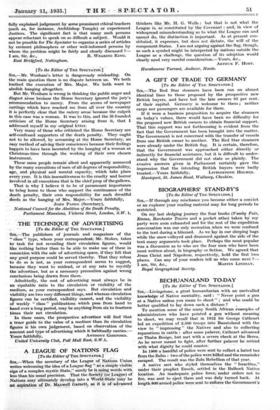[To the Editor of THE SPECTATOR.]
SIRS Mr. Wenham's letter is dangerously misleading. On the Main qUestion there is no dispute between us. We both loathed the execution of Mrs. Major. We both want to abolish hanging altogether.
But Mr. Wenham is wrong in thinking the public anger and disgust arose becituse the Home Secretary ignored the jury's rebornmendation to mercy. From the scores of newspaper Cuttings which have reached me from all over the country it is perfectly clear that 'the outcry arose- becanse the culprit in this case was a woman. It was to this, and the ill-founded criticism of the Home Secretary arising from it, that I addressed myself in my original letter.
Very many of those who criticized the Home Secretary are self-confessed supporters of the' death penalty. They ought not to be allowed, by screaming at the Home Secretary, an easy method of salving their consciences because their feelings happen to have been lacerated by the hanging of a woman at Christmas-time through the working of their own chosen instrument.
These' same people remain- silent and apparently unmoved by the many executions of men of all degrees of responsibility, age, and physical and mental capacity, which take place every year. It is this insensitiveness to the cruelty and horror inVOlved in all executions that is the chief prop of the gallows.
That is why I believe it to be of paramount importance to bring home to those who support the continuance of the death penalty, their own responsibility for such dreadful deeds as the hanging of Mrs. Major.—Yours faithfully,
JOHN PATON (Secretary),
National Council for the Abolition of the Death Penalty, Parliament Mansions, Victoria Street, London, S.W. 1.






































 Previous page
Previous page